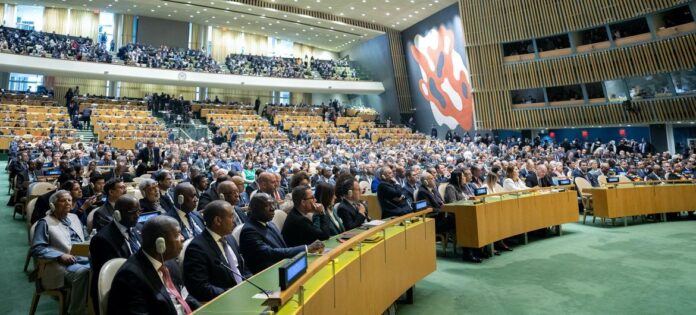The United Nations, African Union (AU), and European Union (EU) have reaffirmed their commitment to advancing peace and sustainable development across Africa, vowing deeper cooperation to end conflicts, strengthen stability, and address global challenges from debt to climate change.
Meeting on Sunday at UN Headquarters in New York on the sidelines of the General Assembly high-level week, the leaders of the three organizations issued a joint communiqué following their sixth trilateral meeting.
They stressed multilateralism as “the most effective way to address today’s challenges,” reaffirmed adherence to the UN Charter, and raised alarm over rising violations of international humanitarian law and human rights worldwide.
Much of the discussion centered on ongoing crises in Africa. The three organizations called for intensified efforts to secure “an immediate cessation of hostilities and a sustainable solution” in Sudan, now in its third year of war. They also pledged stronger coordination in the Sahel, where armed groups continue to destabilize communities.
On Libya, they backed the UN roadmap to revive the stalled political process and urged action on migration management in line with humanitarian standards. They also reaffirmed support for peace initiatives in eastern Democratic Republic of the Congo (DRC), while emphasizing the importance of the AU and UN Security Councils’ ongoing engagement.
The communiqué further reiterated support for the AU Support and Stabilization Mission in Somalia, underlining the need for sustainable financing to ensure its effectiveness.
Looking ahead, the UN, AU and EU pledged to deepen cooperation around African-led solutions. They highlighted the AU’s Agenda 2063 and the UN’s 2030 Agenda for Sustainable Development as guiding frameworks, with preparations already underway for the AU-EU Summit in Angola this November.
Financing was underscored as a key concern. The leaders called for full implementation of the Sevilla Commitment to unlock investment, address mounting debt burdens, and reform multilateral development banks. They also pointed to the urgent threat of climate change, stressing that its impacts fall hardest on vulnerable communities, and urged ambitious commitments at COP30 in Brazil this November.
Marking the 25th anniversary of Security Council resolution 1325, they reaffirmed their commitment to advancing women’s leadership and participation in peacebuilding.
Earlier on Sunday, Secretary-General António Guterres addressed the Global Africa Business Initiative’s Unstoppable Africa 2025 forum, co-organized by the AU and the UN Global Compact. He described Africa as “opportunity,” citing its young population, renewable resources and growing digital economy.
He urged investment in renewable energy, sustainable food systems and digital infrastructure, while ensuring fair returns from Africa’s critical minerals needed for the energy transition. He also called for greater support for smallholders and climate-smart agriculture to end the “paradox” of a continent rich in arable land but reliant on food imports.
“Africa’s rise is undeniable, inevitable and unstoppable,” Guterres declared, pressing for reforms in international finance and governance to give the continent a stronger voice, including permanent representation on the UN Security Council.

